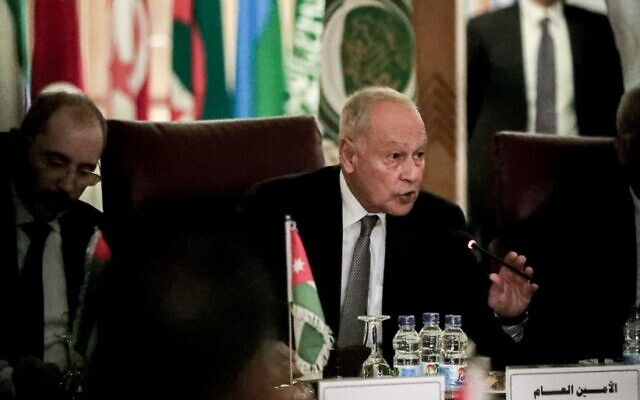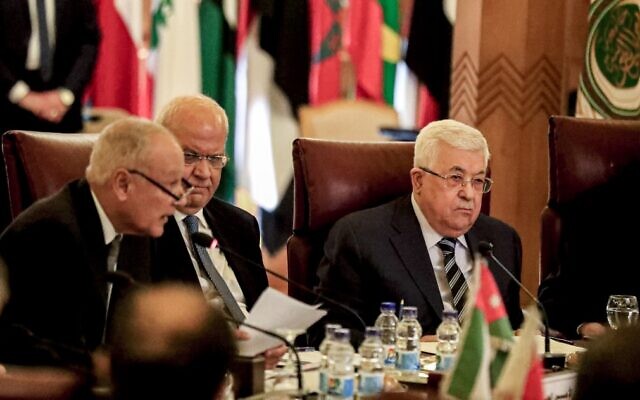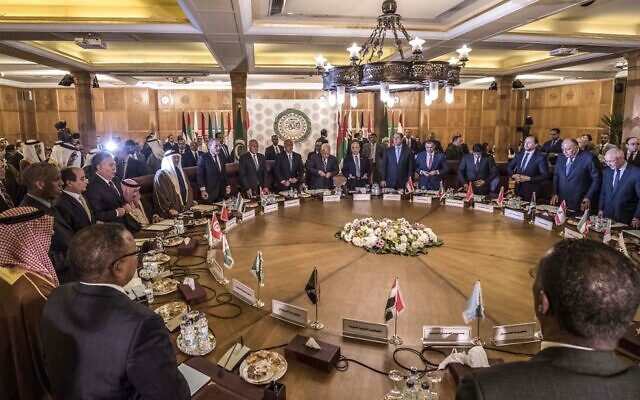Pan-Arab bloc says American offer ‘does not meet the minimum rights and aspirations of Palestinian people,’ vows not to cooperate with administration on proposal
By AGENCIES and TOI STAFF Today, 4:58 pm
This picture taken on February 1, 2020 shows a view at an Arab League emergency meeting discussing the US-brokered proposal for a settlement of the Middle East conflict, at the league headquarters in the Egyptian capital Cairo, as delegates take to their seats (Khaled DESOUKI / AFP)
The Arab League on Saturday rejected US President Donald Trump’s controversial Middle East plan, calling it “unfair” to Palestinians.
The pan-Arab bloc said in a statement that it “rejects the US-Israeli ‘deal of the century’ considering that it does not meet the minimum rights and aspirations of Palestinian people.”
Arab leaders also vowed “not to… cooperate with the US administration to implement this plan.”
According to Channel 13 news the decision was unanimous.
The US plan would grant the Palestinians a state with restricted sovereignty in Gaza and in parts of the West Bank, while allowing Israel to annex all its settlements and keep nearly all of East Jerusalem.
The League warned that Israel must not act on the plan unilaterally — a reference to Israel’s stated intention to move on annexation as soon as possible.
“Israel will be solely responsible for the consequences of such policies,” the bloc said. It said it would call on international powers to take steps to prevent any such action.
Palestinian Authority President Mahmoud Abbas warned at an emergency meeting of the bloc that he would cut all ties with both Israel and the US, including security coordination, over the White House plan.
The summit of Arab foreign ministers in the Egyptian capital, Cairo, was requested by the Palestinians, who responded angrily to the American proposal.
“We’ve informed the Israeli side…that there will be no relations at all with them and the United States, including security ties,” Abbas declared.
Abbas has threatened to cut security ties in the past on several occasions though he has not followed through with action on the ground.

Palestinian Authority President Mahmoud Abbas holds a placard showing maps of (L to R) historical Palestine, the 1947 United Nations partition plan on Palestine, the 1948-1967 borders between the Palestinian territories and Israel, and a current map of the Palestinian territories without Israeli-annexed areas and settlements, as he attends an Arab League emergency meeting discussing the US-brokered proposal for a settlement of the Middle East conflict at the league headquarters in the Egyptian capital Cairo on February 1, 2020 (Khaled DESOUKI / AFP)
“I will never accept this solution,” Abbas said. “I will not have it recorded in my history that I have sold Jerusalem.”
He said the Palestinians remain committed to ending Israel’s control of the West Bank and establishing a state with its capital in East Jerusalem.
Abbas insisted Palestinians were not rejectionists and were not simply refusing without any counter offer. “We’re not nihilists,” he said.
The Palestinian leader said he was willing to present an alternative proposal before the UN Security Council.
Abbas received long applause from the Arab foreign ministers in attendance after his speech.
There was no immediate comment from US or Israeli officials.
The Axios website reported that the White House had asked a number of Arab countries to prevent an Arab League resolution against the plan, citing US officials.
Saudi Foreign Minister Faisal bin Farhan said at the meeting that “Peace efforts sohlud seek to achieve a just solution that includes Palestinian rights. Saudi Arabia will always support the choices of the Palestinian people.”
Egypt had initially indicated openness to the plan but stood behind the resolution, saying “The Gyptian position is well known and is in line with international resolutions, on establishing a Palestinian state with East Jerusalem as its capital.”
And Jordan’s top diplomat, Ayman Safadi, said: “We warn against the consequences of any unilateral Israeli step that will determine facts on the ground.” He said establishing and developing settlements was “a breach of international law.”
The Western-backed Palestinian leadership has been under mounting pressure from ordinary Palestinians and its rivals in the Islamic terrorist group Hamas to cut off security ties with Israel and the US or even dismantle the increasingly unpopular Palestinian Authority.
That would leave Israel responsible for the complicated and expensive task of providing basic services to hundreds of thousands of Palestinians in the West Bank.
Abbas said the Palestinians wouldn’t accept the US as a sole mediator in any negotiations with Israel. He said they would go to the United Nations Security Council and other world and regional organizations to “explain our position.”
The Arab League’s head, Ahmed Aboul Gheit, said the proposal revealed a “sharp turn” in the long-standing US foreign policy regarding the Israeli-Palestinian conflict.

Arab League Secretary-General Ahmed Aboul Gheit speaks during an Arab League emergency meeting discussing the US-brokered proposal for a settlement of the Middle East conflict, at the league headquarters in the Egyptian capital Cairo on February 1, 2020 (Khaled DESOUKI / AFP)
“This turn does not help achieve peace and a just solution,” he declared.
Aboul Gheit said that the Palestinians reject the proposal. He called for the two sides, the Israelis and the Palestinians, to negotiate to reach a “satisfactory solution for both of them.”
US President Donald Trump unveiled the long-awaited proposal Tuesday in Washington. It would allow Israel to annex all its West Bank settlements — which the Palestinians and most of the international community view as illegal — as well as the Jordan Valley, which accounts for roughly a fourth of the West Bank.
In return, the Palestinians would be granted statehood in Gaza, scattered chunks of the West Bank and some neighborhoods on the outskirts of Jerusalem, all linked together by a new network of roads, bridges and tunnels. Israel would control the state’s borders and airspace and maintain overall security authority. Critics of the plan say this would rob Palestinian statehood of any meaning.
The plan would abolish the so-called right of return for Palestinian refugees displaced by the 1948 war and their descendants, a key Palestinian demand, and one that Israel has always rejected as an attempt to wipe out the Jewish state by weight of numbers. The entire agreement would be contingent on Gaza’s Hamas rulers and other terror groups disarming, something they have always adamantly rejected.
Israeli Prime Minister Benjamin Netanyahu immediately declared his support for the scheme. He also initially said Israel would quickly move to annex the Jordan Valley and West Bank settlements with Washington’s okay — only to have the White House clarify quickly that there was no approval for immediate annexation moves.
Ambassadors from the United Arab Emirates, Bahrain and Oman attended the Tuesday unveiling in Washington, in a tacit sign of support for the US initiative.

Palestinian Authority President Mahmoud Abbas (R) and Palestine Liberation Organisation (PLO) Secretary-General Saeb Erekat (C) look on as Arab League Secretary-General Ahmed Aboul Gheit (L) reads a statement during an Arab League emergency meeting discussing the US-brokered proposal for a settlement of the Middle East conflict, at the league headquarters in the Egyptian capital Cairo on February 1, 2020 (Khaled DESOUKI / AFP)
Saudi Arabia and Egypt, Arab states that are close US allies, said they appreciated Trump’s efforts and called for renewed negotiations without commenting on the plan’s content.
Egypt urged Israelis and Palestinians to “carefully study” the plan. It said it favors a solution that restores all the “legitimate rights” of the Palestinian people through establishing an “independent and sovereign state on the occupied Palestinian territories.”
Jordan, meanwhile, warned against any Israeli “annexation of Palestinian lands” and reaffirmed its commitment to the creation of a Palestinian state along the 1967 lines, which would include all the West Bank and Israeli-annexed East Jerusalem.

Arab Israelis take part in a rally to express their opposition to the US-brokered proposal for a settlement of the Middle East conflict, in the Arab-Israeli town of Baqa al-Gharbiya in northern Israel on February 1, 2020 (Ahmad GHARABLI / AFP)
Jordan and Egypt are the only two Arab countries that have peace treaties with Israel.
On Thursday, a senior PA official spoke of Ramallah’s disappointment in Arab nations’ muted and sometimes-supportive response to the US peace proposal, saying the PA had been hoping “for much better.”
Hussein al-Sheikh, PA Civil Affairs Minister, member of the Fatah Central Committee and a close confidant of Abbas, said there was concern that Arab nations, who the PA had hoped would back their position, may become a “dagger in Palestinian people’s side.”




The list of all the things that Israel is being warned against doing , is the list of all the thing Israel should be doing immediately.
No surprise here but as usual where does such denial without any constructive discourse assist any forward movement to solving the problem. . They are not even prepared to read and try to understand what is being offered in this plan. So it seems quite clearly that the Arabs are still mentally stuck on the religious issue of Jerusalem explained quite clearly by Motty Kedar